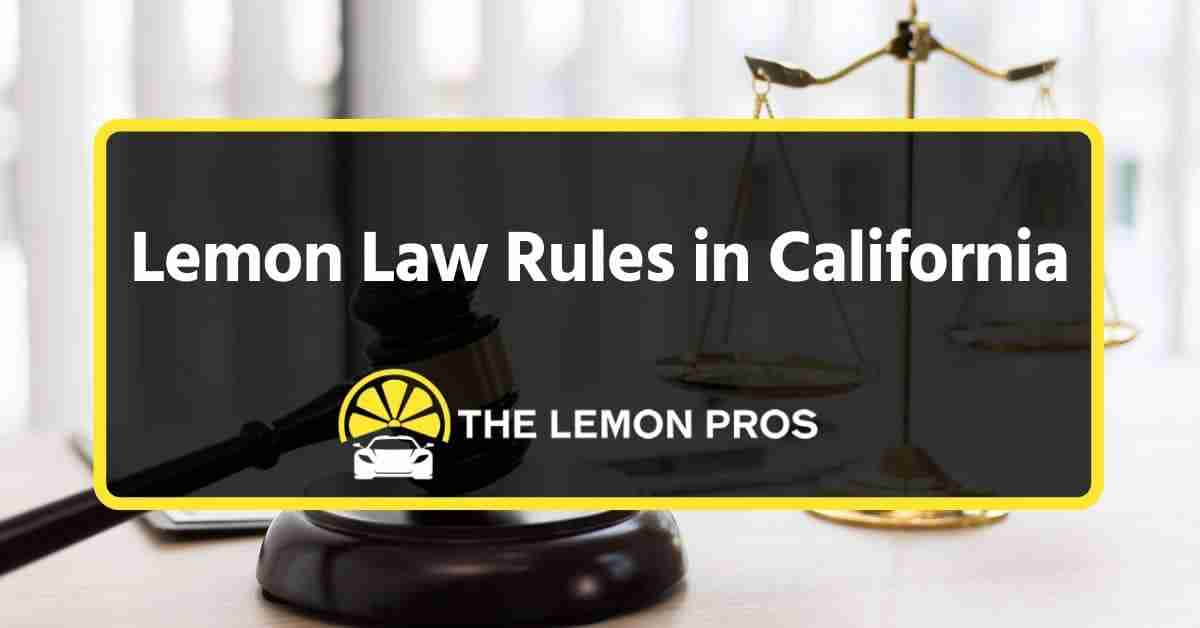
Can a Dealer Sell a Lemon Car?
A lemon car is one with irreparable defects that substantially impair its use, value, or safety. Thankfully, there are federal and state laws that protect consumers from lemon cars. Typically, a car dealership cannot knowingly sell a lemon car to a customer in California without disclosing that information. There are exceptions, such as in the case that the lemon was repaired after a buyback, but the title would need to be branded as a warning to drivers.
The Lemon Pros are experts in consumer protection laws. With a practice area focused on Lemon Law, our team of professionals can help you navigate issues with your defective vehicle. Before you file a Lemon Law claim, reach out to us for a free consultation or give us a call at (323) 675-3282.
In this guide, we look closely at the definition of a lemon car and determine if it’s legal for a dealership to sell one. We also show you the legal options that may be available to you if you have a lemon car.
Table Of Contents
- What Does It Mean When a Car Is a Lemon?
- Is It Legal for Dealers to Sell Lemon Cars?
- How to Protect Yourself When Buying a Used Car From a Dealer
- What Legally Defines a Lemon Car?
- Can a Dealer Sell a Lemon Vehicle?
- What Are My Legal Options if I Bought a Lemon From a Dealer?
- What to Do if a Dealer Sold You a Lemon Car
- How to Avoid Buying a Lemon from a Dealer
- Need Expert Legal Help With Your Lemon Law Case?
- FAQ
What Does It Mean When a Car Is a Lemon?
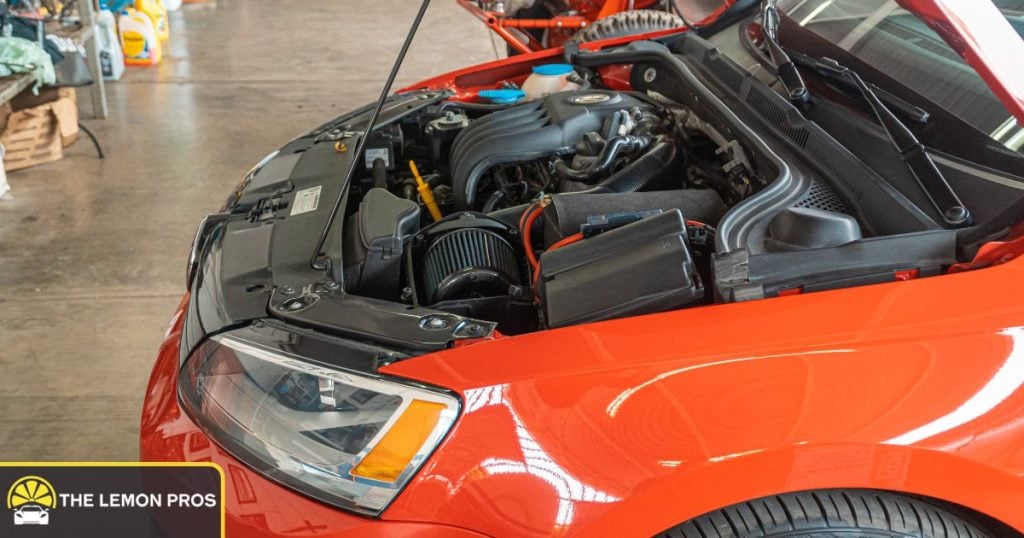
A lemon car is a vehicle with serious defects that substantially affect its use, value, or safety and cannot be repaired after a reasonable number of attempts to do so. These issues must arise while the vehicle is still covered under the original manufacturer’s warranty.
Common examples include major engine or transmission problems, brake failures, steering defects, electrical system malfunctions, or other recurring safety-related issues. State lemon laws are designed to protect consumers in these situations. If a vehicle meets the legal definition of a lemon, the manufacturer may be required to repurchase or replace it.
Not every problem vehicle qualifies. Minor cosmetic damage, normal wear and tear, or routine maintenance issues do not make a car a lemon. The defect must be serious, ongoing, and unresolved. It is best to consult with a qualified attorney to understand how the Lemon Law works.
Is It Legal for Dealers to Sell Lemon Cars?
In general, a dealer can legally sell a vehicle that was previously declared a lemon, unless state law prohibits the sale or imposes strict disclosure requirements. In California, the key issue is transparency, not an outright ban.
Dealer Disclosure Obligations
Under the California Lemon Law for used cars, dealers are typically required to disclose:
- Whether the vehicle was repurchased under a lemon law.
- Known material defects.
- A branded or lemon title, if applicable.
Some states specifically require dealers to notify buyers in writing if a vehicle has a lemon law buyback history or title brand. Failure to disclose this information can lead to legal consequences.
Risks for Consumers
When a lemon vehicle is resold, buyers may face:
- Recurring mechanical problems.
- Reduced resale value.
- Limited warranty protection.
- Ongoing repair costs.
Because laws vary, consumers should carefully review vehicle history reports and disclosure documents before purchasing. Understanding your rights can help you avoid unknowingly buying a lemon vehicle from a dealer.
Dealer Obligations vs Consumer Rights Under Lemon Laws
How to Protect Yourself When Buying a Used Car From a Dealer

To reduce the risk of buying a lemon car, take a few proactive steps before purchasing. Start by reviewing a vehicle history report and consider buying certified pre-owned vehicles, which often include inspections and added warranty coverage. Have the car inspected by an independent mechanic before you buy, even if it appears problem-free.
Check for lemon titles, buyback disclosures, and confirm what warranty coverage applies after the sale. It is critical to know what is covered under a car warranty before you need it. These details matter if problems arise later.
If serious defects appear after purchase, lemon laws may still provide protection in certain situations, especially when the vehicle remains covered by the manufacturer’s warranty. Understanding these safeguards can help protect your rights if a dealer sells you a lemon car.
Checking for a Lemon Title
A lemon title (sometimes called a lemon law buyback title) means the vehicle was repurchased by the manufacturer after qualifying under state lemon law. The title is permanently branded to alert future buyers that the car had significant defects. According to Experian data, 155,000 vehicles on the road have a reported lemon event.
A lemon title can reduce resale value and make the vehicle harder to sell. It may also impact coverage options or premiums. In fact, many buyers ask, does a lemon title affect insurance, and the answer is often yes. Some insurers may adjust rates or limit certain coverage types due to the vehicle’s history and diminished value.
To check for a lemon title:
- Review a reputable vehicle history report, such as through CARFAX or AutoCheck.
- Examine the physical title for branding or buyback notations.
- Ask the dealer directly for written disclosure.
Confirming title status before purchase helps you avoid unexpected financial and insurance consequences later.
What Legally Defines a Lemon Car?
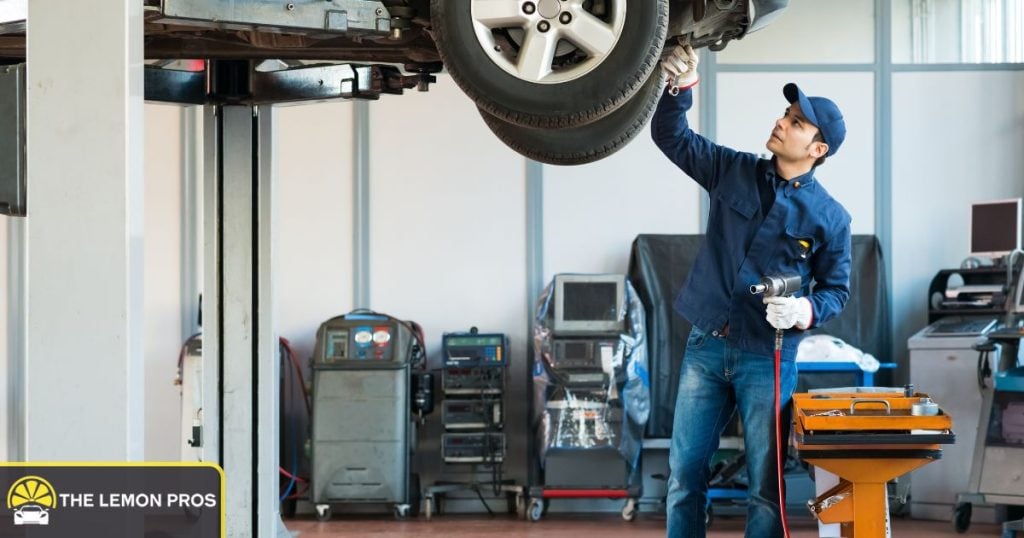
Every car can end up having some issues, but that doesn't make it a lemon. How do I know if I have a lemon? In California, the lemon regulations flow through the Song-Beverly Consumer Warranty Act. The criteria cover new cars with the manufacturer’s warranty. The vehicle must meet the following requirements to file a claim:
- Defect starts within 18,000 miles or 18 months, whichever comes first
- Defect substantially impairs the car’s use, value, or safety
- Dealership is given a minimum of four repair attempts to fix the problem (two is a reasonable number of attempts for serious safety issues)
On the other hand, if the dealership holds your car for more than a month to address a single complaint, you may be able to bypass the minimum number of repair attempts.
The new vehicle must be for personal use only, while off-road vehicles are not covered. It can be a truck, SUV, minivan, sedan, or coupe. There is also some protection for motor homes, recreational vehicles, motorcycles, and boats. This is because every state has its laws, it's critical to do further research before pursuing a claim.
Does California Lemon Law Apply to Used Cars?
Not every state covers used cars under Lemon Law protections. For example, Georgia, Idaho, Michigan, Ohio, and Tennessee will not help with used lemons. In California, the Lemon Law applies to the Certified Pre-Owned or used car if the manufacturer’s warranty is still in place. The used car Lemon Law is only applicable if you purchase the car from a qualified dealership. A used vehicle purchased from a private seller is considered as-is and gives you no protection
Can a Dealer Sell a Lemon Vehicle?
The only way a dealer can sell a lemon car in California legally is if it was part of a Lemon Law buyback. When the vehicle was purchased back from the previous driver, it was given a lemon-branded title, indicating its status to future buyers. While the dealer must disclose the status of the vehicle, the defect itself is not guaranteed to be repaired, nor is it going to be covered under warranty.
The dealership has no legal requirement to repair the car for you. Buying a Lemon Law buyback vehicle means that you accept the risk of that same recurring problem. While you can get a great deal on these cars, you are going to pay more for auto insurance, and the value of the car is going to be lower.
If the lemon status of a car is not disclosed and there are attempts to commit fraud, you may be able to sue the car dealership.
Dealer Responsibilities When Selling Vehicles
What are the responsibilities of a car dealer when selling vehicles? Here are a few important guidelines to consider, related to both new and used car dealers:
- They must disclose any known issues.
- All state inspection rules must be followed.
- The warranty terms must be clearly explained.
While the dealership has the responsibility to explain the car warranty being offered, you must understand what they mean and how they differ. Express warranties are specific promises made by the dealer about the condition of the vehicle. For example, if the dealer says, “If something goes wrong with the car in the first thirty days, it’s covered,” that would be considered a warranty. With an as-is sale, there is no warranty offered at all. If the car breaks down after the purchase, you have to handle repairs on your own.
Red Flags That a Car Dealership Might Be Selling You a Lemon
As you shop for a vehicle, you want to be aware of the most common signs of car problems. Take your time and listen to your gut if you want to save yourself from a world of trouble. Here are some red flags to look for when car shopping:
- Missing or vague service records
- Lack of a vehicle history report
- Title issues
- Apparent defects showing up during the inspection or test drive that weren’t disclosed
If you aren’t going to have a professional inspection done by a third party, you should educate yourself about the most common car problems. Additionally, you want to watch for any signs of odometer rollback, VIN tampering, or other signs of fraud.
What Are My Legal Options if I Bought a Lemon From a Dealer?
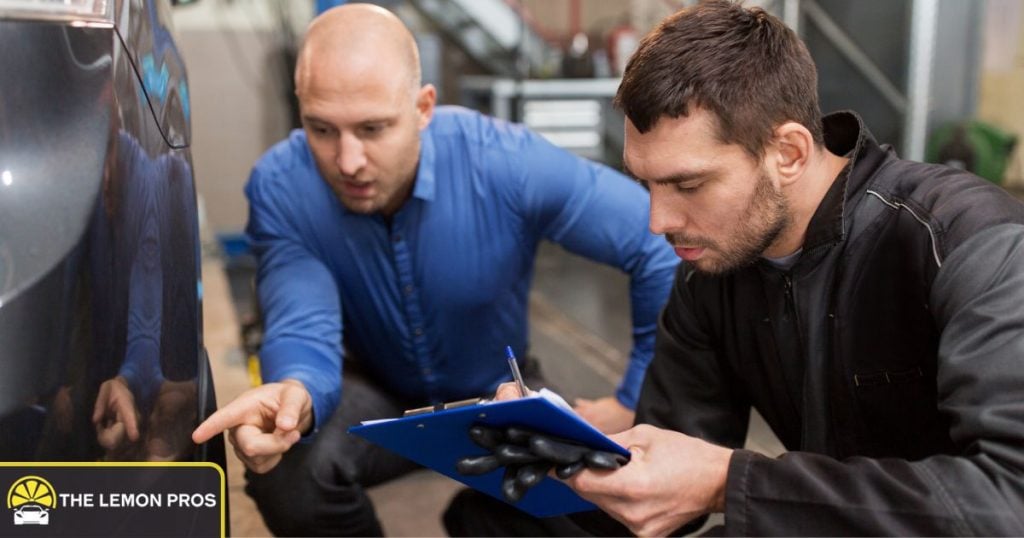
While the Magnuson-Moss Warranty Act is the federal law concerning consumer goods, it is most important to focus on your rights under your local state laws. In California, if the dealer sells you a defective vehicle, you have several options:
Replacement vehicle: The dealer would be required to give you a comparable make or model without the defects in exchange for the one you currently drive.
Buyback: With a Lemon Law buyback, the dealer provides you a reasonable allowance for the purchase price, payments made, down payment, sales tax, registration, and other incidental fees in exchange for getting the car back. While you probably won’t get a full refund for everything spent, there’s a specific Lemon Law buyback formula used to determine what you would be owed.
Cash and keep settlement: In some cases, it makes sense to take a cash and keep settlement. In these situations, you keep the vehicle with the defect, but you receive some monetary compensation for your troubles.
No matter which option you prefer, it’s always best to have a Lemon Law lawyer working on the case. A Lemon Law attorney understands the state regulations and can ensure you get every penny you deserve.
What to Do if a Dealer Sold You a Lemon Car
You have just spent your hard-earned money and valuable time looking for a vehicle that suits your needs, only to find out that it’s a dud. Now what? When the car turns out to be defective, you have options. If the dealership sold you a lemon, here are your next steps:
- Express the issue to the dealer/manufacturer. Initially, you want a record of your complaint, especially if a case needs to be filed later.
- Allow the authorized repair shop the chance to fix it. The dealer is entitled to four repair attempts for most defects. However, if there’s a serious safety concern that could lead to death, you may only be required to give them two chances.
- Consult with a Lemon Law attorney: While you can start a Lemon Law case without a lawyer, it’s never advisable. One small mistake can cost you a lot of money and time. Instead, opt for a free consultation with The Lemon Pros to ensure your rights are protected.
- Send a demand letter: Before you have the right to start a claim, you must send a demand letter to the dealer and manufacturer. This letter should outline the problems and ask for what you want as compensation.
- File a Lemon Law claim: Your lawyer will help you start a Lemon Law claim and explain to you the options you may be faced with. Your attorney can also help you negotiate for a better outcome.
In some cases, you can’t return the car to the dealer without first working through the appropriate steps. Continue to take care of the vehicle and payments until you are given further instructions from a lawyer.
There’s also the option to file with some consumer protection agencies, such as the state’s attorney general’s office or the Better Business Bureau (BBB). In addition to the attorney general and online review sites, you can learn more about your rights through the National Consumer Law Center (NCLC) and get direction on your next legal steps.
Filing a Lemon Lawsuit: Key Considerations
In California, a vehicle qualifies for a lemon lawsuit if serious defects persist despite multiple repair attempts under the manufacturer’s warranty. The defect must start within 18 months or 18,000 miles, whichever comes first. After that, California allows four years for the claim to be filed.
Cases often start with arbitration through the Department of Consumer Affairs (DCA), but you can file a civil suit to seek a repurchase, replacement, or cash settlement. By having an attorney file the lemon lawsuit, you have less stress and have a higher chance of receiving a successful outcome.
Can You Sue a Dealer for Selling You a Defective Vehicle?
Suing a car dealership is more common than you may think. If the dealer violated the Lemon Law and has failed to repair or replace the car, you have legal standing for a case. You can also sue if there’s been a breach of warranty. Furthermore, among the top reasons to sue a car dealership, you also have a case if there’s any misrepresentation or fraud. Finally, the dealer must disclose if they are selling you a lemon car. Not doing so justifies legal action.
Dealers may try to use an “as-is” designation to avoid liability, but this doesn’t always protect them. If the dealer committed fraud or violated any of your consumer protection laws, you should pursue legal action.
How to Avoid Buying a Lemon from a Dealer
You can avoid buying a lemon car and save yourself from all the hassle with future purchases. Here are some tips to consider.
Get a vehicle history report. Enter your vehicle identification number at CARFAX or AutoCheck to ensure it’s not a lemon and to check for recalls. You should also look through the previous repair records to see if the same problem continues to occur repeatedly.
Perform a pre-purchase inspection. Hire a mechanic to take a look at the vehicle for you. A small expense upfront can save you thousands of dollars down the road.
Ask about the car warranty. Make sure you get detailed information about the vehicle warranty. Don’t accept a verbal express warranty. Instead, you want all of this information in writing.
Check online reviews of the dealer. You can learn a lot by reading what other customers have had to say.
Carefully review the sales contract before signing. Most dealerships like to bundle everything together and move very quickly through the paperwork, but you have the right to read through it carefully.
Need Expert Legal Help With Your Lemon Law Case?
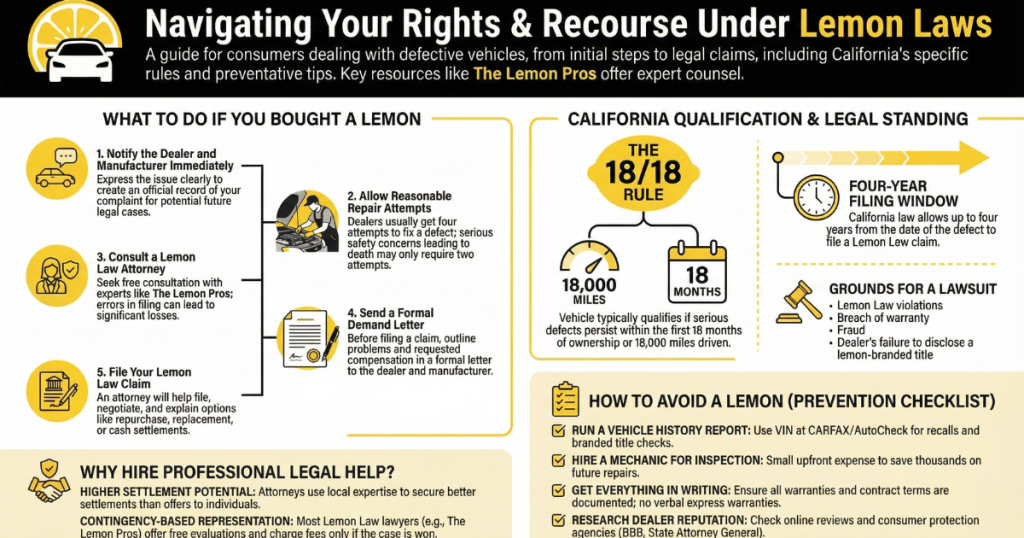
All hope is not lost if you purchased a lemon motor vehicle. If it was claimed as a lemon when the previous owner had it, and the dealer has not disclosed that information, you may be able to file a claim. To sue the manufacturer or car lot, you will need to act fast and document everything.
The Lemon Pros are ready to walk with you through the entire process, from discovery to small claims court, if necessary. As a highly-rated Lemon Law attorney, we have received rave reviews from clients in the same situation. Contact us today for a free case evaluation and learn how we can help you.
FAQ
In case you have more questions about whether car dealers can sell you lemon vehicles, we have provided several answers to the most common inquiries:
Can a Dealership Sell an Unsafe Vehicle?
A dealership can’t knowingly sell an unsafe vehicle without proper disclosures. Open recalls must also be disclosed in the state of California. If there has been any fraud or misrepresentation, you may be able to file a claim with your Lemon Law attorney.
How Can I Tell if a Car Dealer Sold Me a Lemon?
The title should be branded as a lemon vehicle, alerting you to the defects. You would be able to tell this by running a vehicle history report before the sale. If it wasn’t previously recorded as a lemon, you may know that it is because there are irreparable defects that cannot be resolved.
How Does Lemon Car Resale Value Affect Me?
With a lemon-labeled title, the resale value drops dramatically. Buyers see the car as risky, even if the problem is resolved. When you try to sell or trade in the car, you can expect a much lower offer or have trouble getting rid of it at all. It can also be difficult to get car insurance for these vehicles.
What Warranties Protect Me From Buying a Lemon From a Dealer?
The manufacturer’s warranty is provided on new vehicles and covers most repairs at no cost. The Certified Pre-Owned (CPO) warranty comes with some extended manufacturer guarantees when buying a used vehicle. There could also be a dealer warranty for short-term coverage and implied warranties requiring that the car be fit to drive.
Can I File a Lemon Law Claim Without an Attorney?
If the vehicle qualifies for Lemon Law protection, you could file without a lawyer. However, making a small mistake could cost you a lot of money. Aside from that, a lawyer will help you maximize the settlement, ensuring you get everything you deserve. Because most lawyers offer a free consultation and work on a contingency basis, you have nothing to lose.
What Are the Benefits of Having a Lemon Law Attorney?
Because an attorney has extensive knowledge of local laws, you can expect a better cash settlement than what the manufacturer offers individuals without representation. You can also expect reduced stress and tailored advice for your situation. You may not need to pay any attorney fees until you win, so nothing needs to be spent up front.

